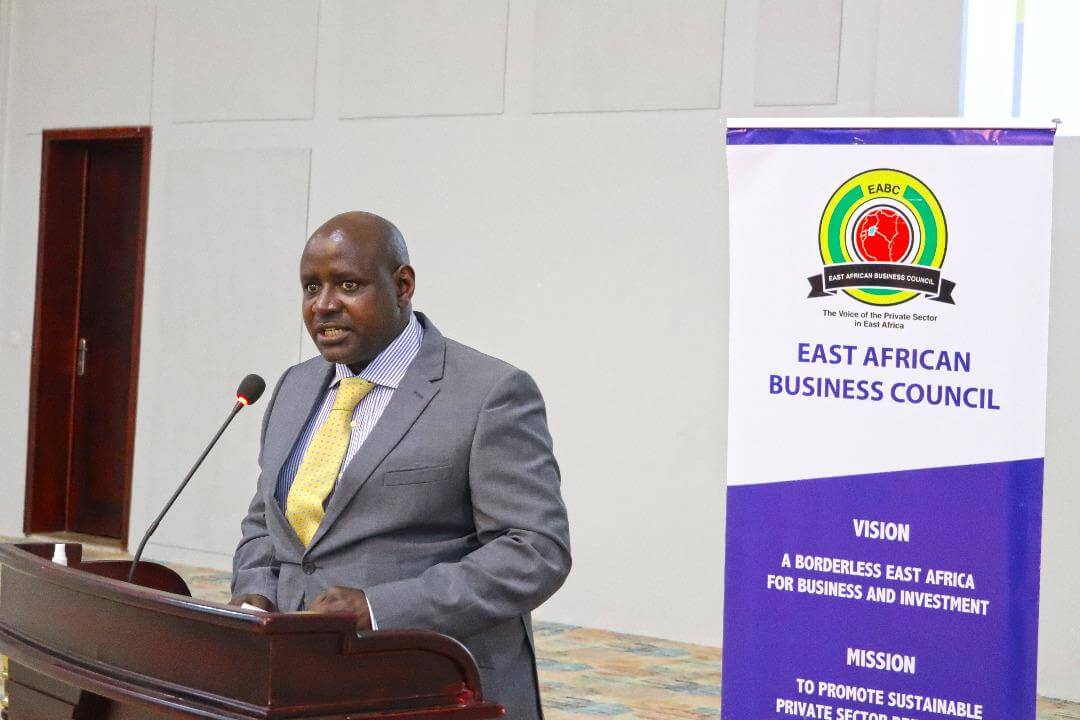Women leaders who attended a one day EABC-TMEA Capacity Building Workshop on the EAC Simplified Trade Regime organized by East African Business Council (EABC) in Kigali-Rwanda, have called upon governments within East African Community (EAC) bloc to scrap off issuance for simplified certificate of origin within the regional body.
The Workshop was held on 30th August and attended also by youth ambassadors from the border points of East Africa with a view to share experiences and chart out policy recommendations on how to boost trade.

The Chief Executive Officer of East African Business Council (EABC) Mr. John Bosco Kalisa makes a point to participants of a one-day workshop organized by his organization in Kigali the capital city of the Republic of Rwanda recently. Photo / Courtesy
According to the Press Release issued by EABC’s Chief Executive Officer John Bosco Kalisa whose copy was made availed to The Business Wiz , in their presentations, women leaders expressed their concerns and views in regard to the matter in order to harmonize trade regimes that would help open trade opportunities to the needy groups.
A Member of Parliament for East African Legislative Assembly (EALA) Hon. Pamela Maassay in her presentation said, “The EAC Simplified Trade Regime is a special provision for small traders who regularly transact in low-value consignments.”
Hon. Pamela further clarified over the use of an approved simplified certificate of origin exempts consignments of goods that Originate in the EAC saying that are valued at under US$ 2000 from payment of import duty in the EAC destination country.
Her views targeted the legal basis of the Simplified Trade Regime that is in rule 14 of the EAC Rules of
Origin particularly paragraph 4 which provides for use of a regularly updated and circulated Eligible List of Products (ELP) for ease and simplification of intra-EAC trade.
Another presenter was TradeMark East Africa’s Country Director for Rwanda Patience Mutesi, who said that TradeMark East Africa has variable roles to play in the jurisdiction of EAC states.
She highlighted various commitments geared towards improving infrastructure, border coordination citing piloted cross-border markets at Rubavu and Rusizi with amenities for women which has greatly facilitated small scale cross border trade.”
She further elaborated that nearly 70 per cent of trading activities are informal and therefore, inefficient border processes and low production capacity affect small cross-border trade.
She lauded the EABC-EASSI-Ministry for building the capacities of small cross-women border traders stating that empowered women are empowered families, communities and nations.
On her part, Lina Asiimwe from Eastern African Sub-regional Support Initiative (EASSI) noted that, “the rollout of One Stop Border Posts (OSBP) have enabled women to move from informal to formal, hence this has gazette trade routes.
She appealed for the EAC Simplified Certificate of Origin issued at no cost across all EAC borders to women small traders cross the border.
Earlier while speaking at the workshop, EABC’s CEO John Bosco Kalisa said, “His organization will take stock of the impending issues and enable youth and women cross-border traders, to share experiences on the usability of the trade regime.”
Kalisa said, “Misinterpretation and low understanding of the EAC Simplified Trade Regime by Customs Officials and small cross-border traders is one of the main challenges hindering full utilization of the regime”.
He urged for the maximum cargo value threshold under EAC Simplified Trade Regime of US$ 2000 to be upgraded to US$ 5000 for more trade to happen.
On his part, EABC Vice-Chairman Mr. Dennis Karera said EABC is committed to advocating for an effective EAC Simplified Trade Regime for trade that reflects realities on the ground. He cited that over
40,000 cross-border traders mainly women use the Petit Barrier between Rwanda and the Democratic
Republic of the Congo.







